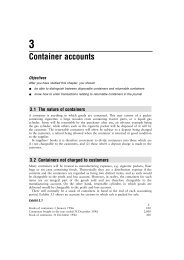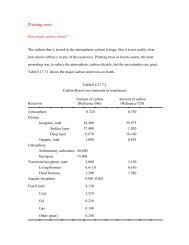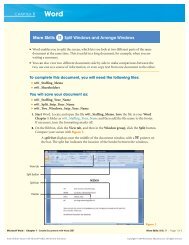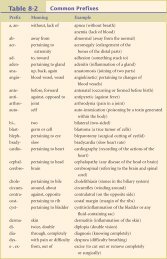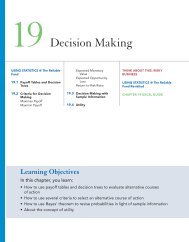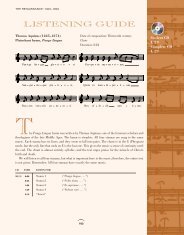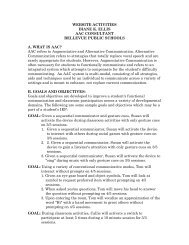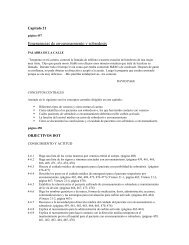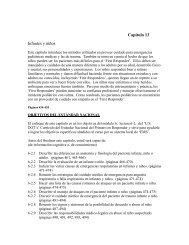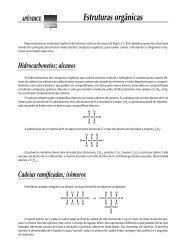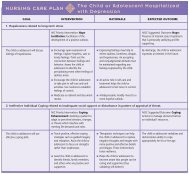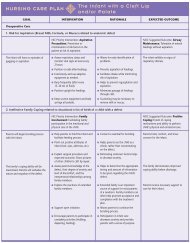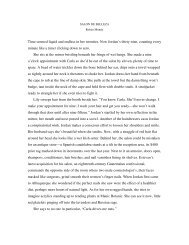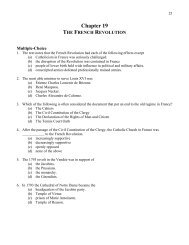French Verb Primer by Helene Gallier-Morgan Regular ... - Pearson
French Verb Primer by Helene Gallier-Morgan Regular ... - Pearson
French Verb Primer by Helene Gallier-Morgan Regular ... - Pearson
You also want an ePaper? Increase the reach of your titles
YUMPU automatically turns print PDFs into web optimized ePapers that Google loves.
pleuvoir: il pleuvra<br />
pouvoir je pourrai<br />
recevoir: je recevrai<br />
renvoyer: je renverrai<br />
revenir: je reviendrai<br />
savoir: je saurai<br />
se souvenir: je me souviendrai<br />
tenir: je tiendrai<br />
venir: je viendrai<br />
voir: je verrai<br />
vouloir: je voudrai<br />
THE 'FUTUR ANTERIEUR'<br />
The 'futur antérieur' (future perfect) is a compound tense. It is formed <strong>by</strong> combining the past participle of the<br />
main verb and the auxiliary verbs 'être' or 'avoir' in the 'futur simple'. The verbs conjugated with 'être' in the<br />
'futur antérieur' are those which also take 'être' in the 'passé composé' (reflexive verbs, and the following simple<br />
verbs: aller, arriver, descendre, devenir, entrer, monter, mourir, naître, partir, rentrer, repartir, rester, retourner,<br />
revenir, sortir, tomber, venir).The same rules of agreement of the past participle in the 'passé composé' are<br />
applied in the 'futur antérieur.'<br />
Ex: finir : J'aurai fini/Tu auras fini/Il aura fini/Nous aurons fini/Vous aurez fini/Ils auront fini<br />
Ex: partir : /Je serai parti(e)/Tu seras parti(e)/Il sera parti/Nous serons parti(e)s/Vous serez parti(e)(s)(es)/Ils<br />
seront partis<br />
USE OF THE 'FUT UR ANTERIEUR'<br />
1. The 'futur antérieur' refers to a future action considered to be completed before other actions in the 'futur<br />
simple' begin. Ex: J'aurai fini avant ce soir. I will have finished <strong>by</strong> tonight. Ex: Quand il aura reçu ta lettre, il<br />
répondra à tes questions. When he has received your letter, he will answer your questions.<br />
N.B. In <strong>French</strong> - contrary to English - the verb in a subordinate clause with 'quand' (when), 'dès que' (as soon<br />
as) and 'aussitôt que' (as soon as) must be conjugated in a future tense whenever the verb in the main clause is in<br />
the future.<br />
2. The 'futur antérieur' can also be used to express a supposed reason for a completed action. Ex: Marie n'est pas<br />
encore rentrée. Elle sera restée au bureau. Marie is not back home yet. I guess she has stayed in the office.<br />
FUTUR PROCHE<br />
The 'futur proche' (immediate future) is formed with 'aller' in the present indicative; the main verb remains in<br />
the infinitive.<br />
Ex: faire<br />
Je vais le faire/I am going to do it<br />
Tu vas le faire/You are going to do it<br />
Il va le faire/He is going to do it<br />
Nous allons le faire/We are going to do it<br />
Vous allez le faire/You are going to do it<br />
Copyright © 2007 <strong>Pearson</strong> Education Canada<br />
9



